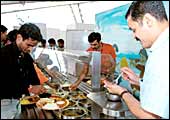 |
| MindTree's soota (right): When it comes
to keeping employees happy, a shared meal and a smile can
go a long way |
It's
just seven years old, and is already among the most preferred
employers in the country. it services company MindTree Consulting
had come in at # 11 on our 2003 list, but didn't quite make it
last year. Now, it's back, and with good reason. The 10-person
start-up of yesterday has today morphed into one of the most recognisable
names in the industry. But that's not why MindTree is here. It's
here primarily because it has managed to retain the character
of a small, closely-knit organisation despite its growing profile.
Still a comparative midget with just $55 million (Rs 247.5 crore)
in revenues, MindTree has managed to hold its own among 400 pound
gorillas, keeping attrition levels well below industry averages
and becoming a much sought after employer for fresh grads and
experienced pros alike.
 |
| It's baby's day out: In a special initiative,
mothers have their workstations at the crèche, so they
can mind their babies too |
"We try and retain the same values we
started off with," says Ashok Soota, Chairman & Managing
Director, MindTree Consulting. The company's values are reflected
at different levels in different ways-like when Soota, a former
Vice Chairman of Wipro, tells an exhausted techie to take time
off and get some shut-eye; when busloads of MindTree Minds (that's
what the company calls its employees) spend their Saturdays at
old age homes; and mothers' workstations are moved to the company's
crèche, in a programme called Baby's Day Out, so that they
can manage their kids while carrying on with the work at hand.
The result? MindTree has an overall attrition
of just 12 per cent and just 1 per cent at the senior management
level, compared to the industry average of 20 per cent and 10
per cent, respectively. "We want to make MindTree a great
place to work in," Soota says, "and that begins right
from the day we hire people. Our Arboretum Initiative gives new
recruits time to settle into our culture; we don't like rushing
them into live projects." The Arboretum is a programme which
assimilates new Minds into the MindTree culture.
SNAPSHOT
REVENUES: Rs 247.5
cr
PROFITS: Not available |
Total employees: 2,800
Attrition (per cent): 12
Average career tenure: 5 years
Training budget (actual): Rs 1.12
cr
Training man-hours (actual): 96,000 |
Soota and MindTree coo Subroto Bagchi closely
monitor the people function at MindTree (the latter is also the
global People Head of the company) and employees see them as accessible
sounding boards. "Soota's door is always open, even for the
junior-most employee in the organisation," says Anshuman
Singh, a senior it consultant at the company who quit TCS to join
the then fledgling MindTree six years ago. And salary is no longer
the most important metric employees like Singh consider when they
decide to make a long-term commitment to the company. "As
we are a VC-funded company, we face certain constraints on this
front. So, we have to offer other incentives to make MindTree
a preferred employer in the increasingly competitive market,"
says Puneet Jetli, General Manager, People Function, at the company.
How? By promoting, on an average, a third of its employees every
year. And, by offering lucrative stock options. Soota admits that
going public is very much on the radar of the privately held company.
MindTree also encourages employees to make
cross-functional shifts, and the firm's Competency to Culture
(c2c) initiative has senior company execs guiding greenhorns on
the best possible career choices. Besides, Mindtree's leadership
courses are often attended by 25-year-olds who've been marked
out for future leadership roles.
Like many of its other people initiatives,
MindTree's mentoring programme, too, is innovative. It has tied
up with Nalanda, an organisation that focusses on bringing slum
kids face-to-face with their corporate benefactors. "Nurturing
people is a top priority," says Jetli. Given that quality
engineers are a scarce resource (the operative word here is quality,
not engineers), Soota, Bagchi and Jetli are not afraid to experiment
in their quest to keep their employees "joyous". There
are at least 25 voluntary communities thriving within MindTree
that are involved in pursuits ranging from writing Java code to
spirituality to long-distance trekking. The company also organises
a Carnival in February every year where employees and their extended
families can unwind; Symfonia is a birthday celebration for MindTree
Minds; and Healthy Body in a Healthy Mind is run by Soota himself.
"You can't wait for a problem to crop up and then try and
solve it; today's employees want a much more proactive approach,"
Jetli says. This means individual units have separate hr arms-MindTree
has one for it services and another for R&D-to cater to specific
requirements of individual employees.
Despite this, there is clearly some room
for improvement. Though employees perceive the company's culture
to be a strong binding force, they feel the need for more career
counselling and an improvement in the compensation and benefits
packages on offer. The top Minds are aware of this. "We are
simplifying our procedures and practices. The goal: become even
more employee-friendly," says Jetli. As a company that is
rapidly adding to its numbers, MindTree will have to keep raising
the bar in order to remain a preferred employer.
INTERVIEW/ASHOK
SOOTA/CMD
"We Try to Create a Joyful Workplace" |
|
 Mindtree
CMD Ashok Soota spoke to Business Today's
Rahul Sachitanand. Excerpts: Mindtree
CMD Ashok Soota spoke to Business Today's
Rahul Sachitanand. Excerpts:
MNCs and large Indian companies are aggressively hiring
in India. How will you ring fence MindTree from their assault?
Around 60 per cent of MindTree's employees are lateral
hires, many of them on the basis of peer referrals; so techies
can work with their friends here. But despite this, we have
to admit that MNCs are a threat to Indian companies. Not
all our employees have the same career goals; some may aspire
to more management-oriented roles, while others may wish
to remain techies. We try and accomodate all of them. And
I'm happy to say that we haven't really lost any significant
numbers of people to the competition.
How have you managed to keep attrition rates so low?
We have created a place where it's a joy to work. The other
thing that appeals to our employees is that we are among
the fastest growing companies, and expect to cross $100
million (Rs 450 crore) in revenues in six years (of existence).
That's something few of our contemporaries have managed.
I also try to give a personal touch by making it a point
to personally address new inductees myself. We have also
reinvented a dated concept like the company crèche,
where working mothers can keep an eye on their kids while
at work. These, and initiatives like a company carnival,
help us retain our employees.
You've entered the acquisitions game (MindTree recently
acquired two small IT services companies Linc Software and
ASAP Solutions). How difficult is it to integrate people
from different work cultures?
As MindTree continues on its fast-growth path, it will
encounter the same people issues that large organisations
face. The challenge lies in finding synergies and challenging
roles for senior employees of the acquired company.
|
|









 Mindtree
CMD Ashok Soota spoke to Business Today's
Mindtree
CMD Ashok Soota spoke to Business Today's